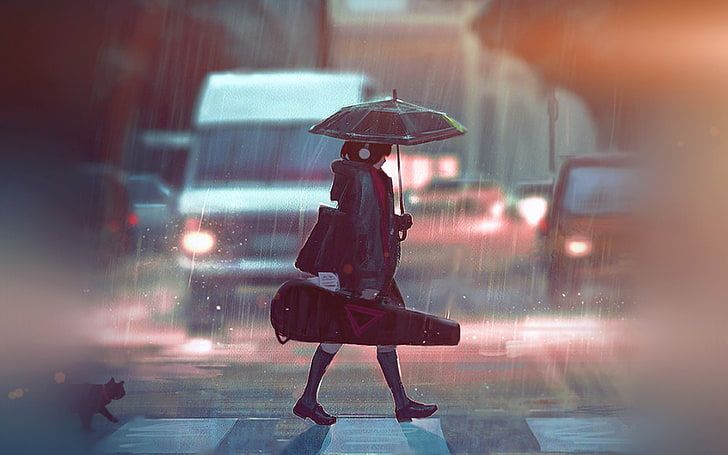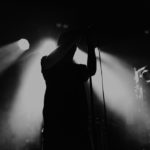A mirror casts reflections upon the item of their focus.
For most objects, their reflection is simply limited to their physical appearance. However for human beings, their reflection goes beyond just that. When a human looks into a mirror, they see themselves in their totality. Along with our physical appearance, reflections seem to present us with a type of perceived truth about ourselves. With this image presented before us, we can come to grasp an understanding for ourselves and the world, relative to us.
With this said, the rendering of reflections are not simply limited to the tangible mirrors of the real world; but rather, mirrors and their reflections can symbolically take the form of many things in life. Through my own personal experience with this project, I explore music as one of these mirrors capable of casting our reflections back at us.
Prior to my admission into UCSD, I always felt as if I had a fairly good understanding of who I was. I always tried to put my best effort into everything I did. Of all the things I chose to spend my time and effort on, nothing compared to my love for music. Music has always been a focal point of my life. From the roaring strings and boisterous brass to the sea of synchronized voices cascading and dancing like the wind around me, I felt nothing but pure bliss being caught amidst it all. Music is what gave my life clarity and a sense of purpose. As long as my life was full of music, I felt at peace.
When the covid pandemic began, this peaceful foundation began to instantaneously crumble around me. What I deemed to be a central pillar of my life, in music, had suddenly been uprooted, with the indefinite cancellations of in-person ensembles and concerts. In its absence, I was left among the rubble desperately trying to keep the roof from caving in. In a blink of an eye, my whole world and sense of purpose in life had vanished without a trace and I was left with no other option but to try to fill the void with something new. Whether I wanted to or not, I had to continue on living without the thing that gave me the most joy in my life and my very own sense of self-identity.
Coming into this school year, in which all musical activities and programs would finally resume in-person, I felt a great sense of both anxiety and relief. On one hand, the cherished relationship I once had with music had suddenly become a tenuous one, where I no longer knew if I could allow myself to fully put my trust into it again. The trauma that came with the sudden abandonment of music in my life stung all too deeply to simply allow myself to forget and move on; and yet, on the other hand, the sweet memories of performing and the prospect of creating art through music sweetly beckoned me.
With the continuation of music programs, I felt as if I finally saw the light at the end of this dark tunnel I traversed through these last twenty months. As enticing as it was to just allow myself to follow that light, a strong sense of doubt began to overtake my thoughts. If something like this pandemic were to happen again, how would I be able to adapt? I felt as if I barely managed to make it through this time around. There I found myself standing in the middle of the tunnel with an important decision to make. Should I continue moving forward, putting my trust back into music and singing, despite it having abandoned me before, or should I turn back and walk away, allowing music to become a distant memory?
When approaching this project, this question was something I found truly difficult to shake from my mind throughout this academic quarter. Ultimately, this led me to choose a song I had sung countless times before, “Caught in the Storm” by Benj Pasek and Justin Paul, as my performance piece. Although I had sung this song countless times in the past, I found myself drawn to this song once again.
Who am I? What does music mean to me now?
I was desperate to find some sort-of answer to these questions that plagued me internally for so long and I hoped to find them within this song.
Although I explored the lyrics of this song numerous times in the past already, it seemed to take on a new meaning this time around. As I carefully read through each verse, I seemingly put myself in the perspective of the character of the song.
“You can push me away, I can take it… I can make you a promise and break it… we know the way this goes by now…”
“Running off just to see if I’ll chase you… I pretend I know how to replace you…still, we get tangled up somehow…”
On their own, these powerful lyrics certainly hold their weight and have the ability to resonate with people who can sympathize with this romantic turmoil. Although I personally couldn’t relate to the romantic context depicted here, I found myself resonating with them in a completely different manner. These lyrics that so vividly told the story of a failing romantic relationship had begun to morph to reflect my own personal narrative of my strained relationship with music.
When I started out practicing this song, I went into each run-through desperately seeking for answers. Throughout those first few weeks, I vividly remember sitting down and meticulously analyzing the lyrics and unintentionally comparing them with my own circumstances. Through each verse, I was reminded of the loneliness and pain of losing music that I was forced to endure. Oftentimes, during those first few run-throughs, I couldn’t help but take breaks between each of the verses. Slowly, these painful lyrics began to cast a reflection of all those bitter memories and emotions back at me. I had never felt so much anxiety and grief from singing before. I knew deep down that I couldn’t continue approaching this project like this. In my mind, music was supposed to be natural and full of joy. My experience with singing up to that point had been anything but that. I had attached too much of my own personal baggage onto this song and because of it, I felt an immense amount of dread and pessimism practicing it during the first couple of weeks.
As a means of correcting this approach, over the following weeks I decided to shift all of my attention to the simple act of singing. Rather than overanalyzing the lyrics, I put my focus strictly on my vocal technique and performance. I found this to be extremely effective in helping me detach myself from that emotional baggage. I allowed my instincts as a musician to take over and surely, the stinging discomfort I initially felt with this song began to fade away. During these run-throughs, I found myself being preoccupied with improving on my performance from each run to the next. With each time completed, I would rewind the recordings I took of myself and nit-pick what I needed to work on for the next time, in order to continually improve. Over the weeks, I began to find joy in my pursuit to continually improve on my vocal technique and performance of the song. It became like a game for me. No longer did I have that initial urge to find an answer within the lyrics. I just sang.
Through my continued practice and efforts to relearn this song, that initial, painful reflection I once saw at the beginning of this project began to change drastically. As I looked into my reflection now, the shades of gray that seemed to surround those past painful emotions seemed to bleed into my blissful nostalgia of my past experiences with music, prior to covid. Along with this, my rediscovered joy for performing and improving as a musician seeped through and transformed this reflection once again until finally, for the first time in a long time, I began to see myself as a musician again.
The hints of gray that accompanied those painful experiences shaded in and gave depth to my rediscovered joy and appreciation for music. Having something dear to you be abruptly taken away ultimately allows for a newfound appreciation for that same thing when you eventually get it back. Through this tempestuous experience of singing this song, I found myself going through a complete journey. Music had always been a huge part of my identity and losing it was like losing a part of myself – my mirror.

